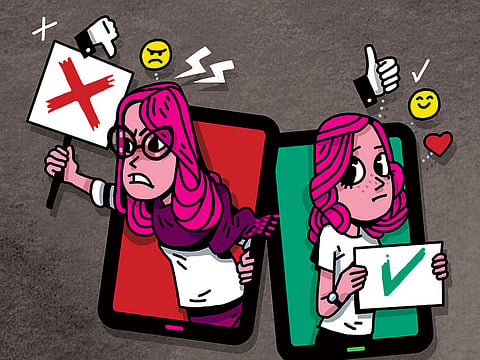Perils of misusing social media
Express yourself in this age of connectivity but make sure that spread positivity and cheer. Not bigotry and prejudice

Social media is a powerful platform to express opinion and awareness. It has made many people instant stars while others have ended up behind bars. If in doubt, ask Sondos Al Qattan or Mona Al Mazbouh. Till recently, I had not heard of Al Qattan, as I am not a diligent follower of social media influencers. I only became familiar with details about the Instagram star when she made news (for all the wrong reasons), and her popularity on social media sank because of her statement against domestic helpers in Kuwait. When people started to point fingers at her (for her racist rant), Al Qattan started losing sponsors. Her case shows the impact that social media has in making and breaking stars.
Over the years several people went to prison for their reckless social media posts. The case of the Lebanese tourist Mona Al Mazbouh, who was sentenced in Cairo last July to eight years in prison, for posting a video on her Facebook page. She used profanities, and was accused of insulting Egypt, Egyptians and their leader.
The problem, it seems, is not with the social media tools. The problem is how those are used.
When we feel angry or upset, it is best to not get online or post anything derogatory.
It is a fact that social media plays an important role in our lives now. Various social platforms have become part of our lives. Facebook was launched in 2004 and was initially limited to college students. By September 2006, it became available to everyone with a valid email address along with a minimum age requirement of 13.
Twitter was opened to the public in 2006, and Instagram in 2010.
Snapchat was launched in 2011. By October 2012, Snapchat says that users are sharing about 20 million images a day, or about 231 per second.
Despite its relatively young age, it is estimated that nearly three billion or 40 per cent of the 7.4 billion-world population is using social media, according to various studies. People spend nearly two hours daily browsing different sites. There are almost half a million tweets and pictures posted on Snapchat every minute.
When the posted words or images are negative, it spreads pessimism, and if they are positive, they spread optimism, studies show.
No conclusive evidence is available if social media really makes us anxious, or stressed, or blissful, or peaceful. However, studies show that the more people use social media platforms, the more their mood tends to swing. And the more the gadgets are used, the more humans suffer from physical issues related to strained muscles and wrong postures.
Yet, today many depend on social media to know more about their surroundings. Many share images with their followers and friends. Those selfies and personal pictures could create a sense of dissatisfaction among others, according to latest research. People start comparing and rating themselves based on others’ images. This may also lead to instances of self-loathing in some people.
Social media obsession has led to other problems. The scene of people eating out, but not talking to each other, is one such instance. Even on social occasions, it is not unusual to see people continuously checking their phones and social media accounts. If people do not wish to talk face to face, and instead opt to scroll up and down their social media accounts, there is no need to step out. They can stay at home and order food. Already, one of the biggest social malaises of our times is the lack of strong social bonds due to different socio-economic factors.
Today, most of people work long hours to meet increasing demands of families and higher cost of living. Many do not have the luxury to spend quality time with others. Social media has further exacerbated the problem by reducing our real, social connections.
In reality, social media is a double edged weapon. It can be good, but it can be bad as well.
Why do we have to post our opinions (some of them not too subtle) on social media openly — only to antagonise others.
Going viral
That was the problem with Sondos Al Qattan. She posted a video of herself commenting on the new Kuwaiti labour laws. One of the new laws offers maids one day off every week. “That’s four days a month. Those are the days that she will be out. And we don’t know what she’ll be doing on those days, with her passport on her”, she lamented.
Within hours, her comments had travelled the world over, bringing ridicule on Al Qattan. Some of the world’s biggest brands in the field of cosmetics and beauty, which eyed Al Qattan’s 2.3 million followers on Instagram, quickly distanced themselves from her.
Was it necessary to post her (half-baked) views on the labour law online?
The same question goes for Mona Al Mazbouh who made derogatory comments about Egyptians and got a jail sentence. Her comments created a wave of other videos by both Egyptians and non-Egyptians who criticised her for making such incendiary comments.
In both cases, the problem was not with the social media. The problem was with how social media was misused to inflame passions.
Therein lies the rub. Feel free to express yourself in this age of digital connectivity but make sure you spread positivity and cheer. Not bigotry and prejudice.


